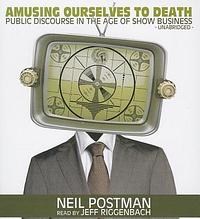Take a photo of a barcode or cover
1.03k reviews for:
Amusing Ourselves to Death: Public Discourse in the Age of Show Business
Neil Postman
1.03k reviews for:
Amusing Ourselves to Death: Public Discourse in the Age of Show Business
Neil Postman
informative
reflective
slow-paced
informative
reflective
medium-paced
challenging
informative
reflective
Postman's basic argument is that, on the Huxley-to-Orwell spectrum, we are closer to Huxley. In other words, rather than being controlled through censorship and propaganda by a power-driven surveillance state, we have essentially captivated ourselves, "drowning truth in a sea of irrelevance, passivity, and egoism."
Putting the NSA aside, I am especially sympathetic to the Huxleyan argument when it comes to things like Amazon, Google, and our culture's sense (lack) of purpose at large, but I see public discourse as reflecting more of a Huxley-Orwell hybrid. You see this in action every time you hop on social media or watch cable news.
The Huxleyan ("culture as burlesque") aspect of the culture/media landscape is that news and social media algorithms are tailored to our emotions. But this is where Huxley is only half right: rather than pleasuring ourselves into meaninglessness, as he predicted, instead we are finding perverse meaning through fear and outrage, defining it in relation to conflict.
The Orwellian ("culture as prison") nature of the culture/media landscape is that the more news media orients itself to consumers (necessitated by the ad-model from which they acquire revenue), the more consumers select for confirmation bias. This tribalizes consumers and deemphasizes the pursuit of truth and shared understanding in an endless feedback loop. Our perverse meaning is buttressed by fake meaning that is hard to escape from.
When you combine the two, you can see how narrative warfare is impacting our ability to make sense of the world, both factually and emotionally. This is not particularly new, but technology now allows data to be filtered and spread through a narrative prism faster than culture-wide sense-making can occur. The result is that rather than synthesizing a meta-narrative with some sort of convergence on truth, empathy, or political compromise, we are engaging in narrative battles that feel like they need to be won. The bottom-line, the algorithm, and our political ideologies demand it. It prevents us from framing and solving bigger problems as a society.
But it need not be that way, according to Postman, if one can step outside the narrative landscape and recognize it clearly. For modern people, the fix is to consume news with a critical eye, recognize it as the zero-sum game that it currently is (and doesn't need to be), be less ideological, be receptive to different points of view, change tech policy where it needs to be changed, accept (and even enjoy if you want) junk media for what it is, and think for yourself. Educate others. And if all that fails, turn off the TV, get off Facebook, go outside, or read a book.
Putting the NSA aside, I am especially sympathetic to the Huxleyan argument when it comes to things like Amazon, Google, and our culture's sense (lack) of purpose at large, but I see public discourse as reflecting more of a Huxley-Orwell hybrid. You see this in action every time you hop on social media or watch cable news.
The Huxleyan ("culture as burlesque") aspect of the culture/media landscape is that news and social media algorithms are tailored to our emotions. But this is where Huxley is only half right: rather than pleasuring ourselves into meaninglessness, as he predicted, instead we are finding perverse meaning through fear and outrage, defining it in relation to conflict.
The Orwellian ("culture as prison") nature of the culture/media landscape is that the more news media orients itself to consumers (necessitated by the ad-model from which they acquire revenue), the more consumers select for confirmation bias. This tribalizes consumers and deemphasizes the pursuit of truth and shared understanding in an endless feedback loop. Our perverse meaning is buttressed by fake meaning that is hard to escape from.
When you combine the two, you can see how narrative warfare is impacting our ability to make sense of the world, both factually and emotionally. This is not particularly new, but technology now allows data to be filtered and spread through a narrative prism faster than culture-wide sense-making can occur. The result is that rather than synthesizing a meta-narrative with some sort of convergence on truth, empathy, or political compromise, we are engaging in narrative battles that feel like they need to be won. The bottom-line, the algorithm, and our political ideologies demand it. It prevents us from framing and solving bigger problems as a society.
But it need not be that way, according to Postman, if one can step outside the narrative landscape and recognize it clearly. For modern people, the fix is to consume news with a critical eye, recognize it as the zero-sum game that it currently is (and doesn't need to be), be less ideological, be receptive to different points of view, change tech policy where it needs to be changed, accept (and even enjoy if you want) junk media for what it is, and think for yourself. Educate others. And if all that fails, turn off the TV, get off Facebook, go outside, or read a book.
challenging
informative
reflective
slow-paced
informative
reflective
slow-paced
3.5 ⭐️. Definitely interesting, especially considering it was written almost 40 years ago and is still applicable.
Should be read if you are a: parent, millennial, pastor, Christian, teacher, politician, American, or human. Excellent, powerful, well-written, in succinct, powerful prose.



